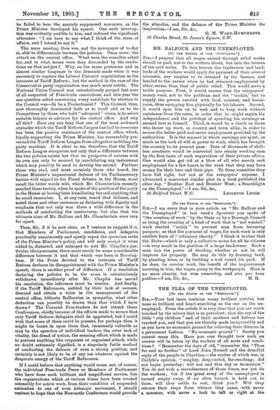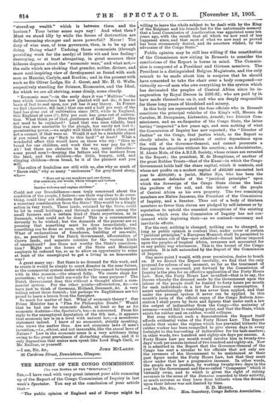Sin,—Your last issue contains many brilliant articles, but none so
brilliant and heart-searching as the one on the un- employed. From the article it is very clear that you are much touched by the misery that is so prevalent; that the cry of the little "city children" and of their mothers and fathers has reached you, and that you are thereby made inexpressibly sad as you have no economic ground for relieving their distress in a permanent fashion. "No economic ground"! Surely you cannot mean this. Have you ever thought how such an answer will be taken by the workers of all sorts and condi- tions P "Remember the days of old, "remember the "Thus far and no further" of Lord John Russell and the dreadful reply of the people in Chartism,—the matter of which was, in Carlyle's opinion, "weighty, deep-rooted, far-reaching; did not begin yesterday; will not end this day or to-Morre- w." You do not wish a recrudescence of those times, nor yet do the workers ; but if the great army of the unemployed is turned empty away, if no olive branch is held out to them, will they settle to rest, think you ? Will they retrace their steps from whence they came, with never a murmur, with never a look to left or right at the
horizon ? Your better sense says nay ! And what then ? Must we stand idly by while the forces of destruction are daily becoming stronger and more powerful ? Never ! The duty of wise men, of true governors, then, is to be up and doing. Doing what P Undoing those economists (through providing work for the needy) of little wit and less feeling : destroying, or at least abrogating, in great measure their hideous dogmas about the "economic man," and what not,— the coils which are choking that grander, nobler, diviner, and more soul-inspiring view of development as found with such
men as Mazzini, Carlyle, and Ruskin; and in the present with such as Sir Oliver Lodge, Sir J. Gorst, and Mr. H. G. Wells,
respectively standing for Science, Economics, and the Ideal, for which we are all striving, some dimly, some clearly.
"Economic man "—in the early days it was "Malthus "—the tree which laissez-faire has now planted will not do; it has no basis of fact to rest upon, nor yet has it any theory. In France we find (Spectator, 4th inst.) that one and a half per cent, of the land has gone out of cultivation since 1875, while in England, this England of ours (?), fifty per cent. has gone out of cultiva- tion. What think ye of that, gentlemen of England ? Does this not need to be explained ? Land that was once tillable, land that was once amenable to the plough, has surely not lost its germinating power,—we might well think this world a chaos, and not a cosmos, if that were so. Would it not be a laudable object if you raised the cry "Back to this land" at least? What a wonderful effect this would have on those who cry : "Give us bread for our children, and work that we may pay for it'" Ah ! but there are obstacles in the way, many obstacles— some proud men ?—keeping the fathers and the mothers from the land, and the children—the little, hungry, cold, and clinging children—from bread, be it of the plainest sort you will.
The relies of feudalism are still with us, else why so much of "Baron rule," why so many " enclosures " for grey-faced sheep, who-
" Have eat up our meadows and our downs. Our commons, our woods, whole villages and townes Besides widowes and orphan children."
Could not our Breadalbanes—men truly concerned about the condition of the people, I believe—see their way clear to do some- thing, could they not abdicate their claims on certain lands for a monetary consideration from the State? This would be a kingly action in very truth. These lands, retained by the State, could be let in small holdings; and through co-operation among the small farmers and a certain kind of State supervision, as in Denmark, what could not be done ? This is a consummation devoutly to be wished; but the demands of the present are so pressing that something must be done immediately, and something can be done so soon, with profit to the whole nation. What of reclamations of foreshores, building of sea-walls,
as practised by the Dutch Government, afforestation of Crown lands, and separate colonies for the various kinds of unemployed ? Are these not worthy the State's considera- tion? Might not the hours of the State and Municipal employes be reduced too, so as to allow an opportunity to some at least of the unemployed to get a living in an honourable way?
A great many say: But there is no demand for this work, and to create it would be simply to court disaster in the near future, as the commercial system under which we live cannot be tampered with in this manner,—the utmost folly. We create ships for protection; why not build sea-walls for the same purpose ? The Dutch Government does this without a thought about a com- mercial system. For the other points—afforestation, &c.—we have just to think of Germany, Holland, Denmark, &O. A very telling retort these furnish; but perhaps we Englishmen are too proud to learn a lesson from the foreigner. So much for matter of fact. What of economic theory ? Our Prime Minister has a "Plea for Philosophic Doubt." Would that he had one for economic doubt, at least so far as his economic doctrine—the Spectator's, too—is concerned. From his reply to the unemployed deputation of the 6th inst., it appears that economic law is on a level with natural law,—a monstrous statement indeed. I know of no economist, strictly speaking, who views the matter thus. Are not economic laws of man's invention,—i.e., ethical, and not inexorable, like the causal laws of Nature ? Law in the economic sense is a very arbitrary thing owing to the great prevalence of disturbing elements, and it is only dogmatism that makes men speak like Lord Hugh Cecil, or Mr. Balfour, or yourself.
—I am, Sir, &c., JOHN McLAnHN.



































































 Previous page
Previous page